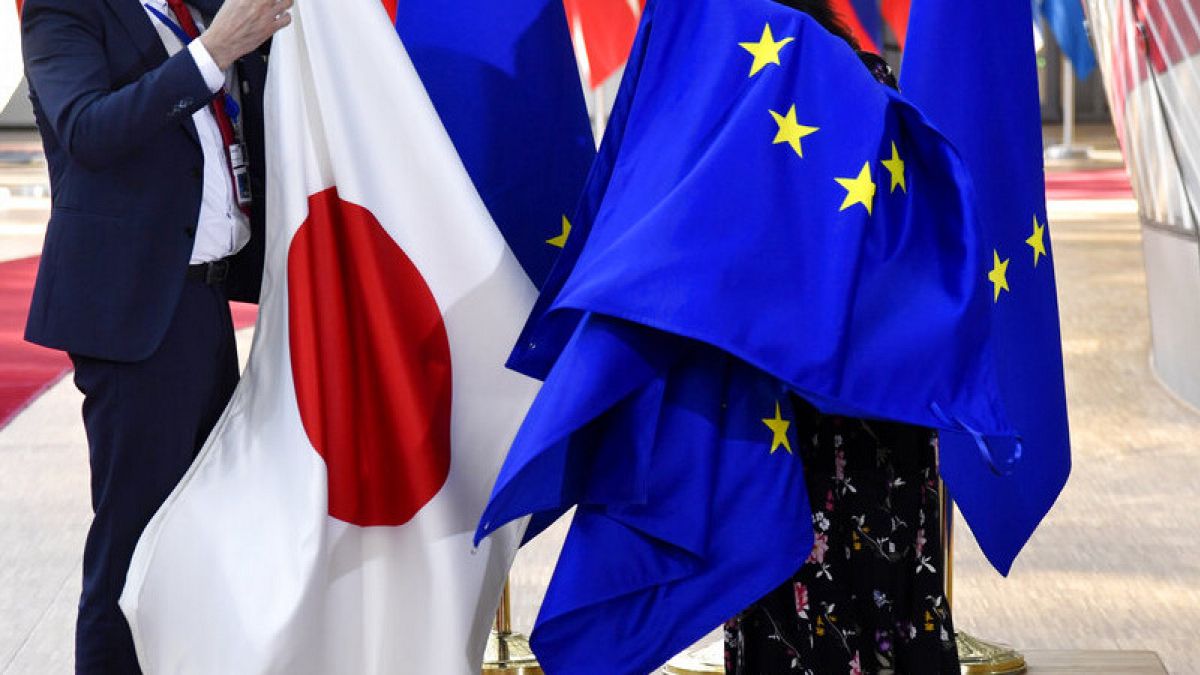Japan and EU sign new defence pact amid rising regional tensions

The partnership is the first of its kind between the EU and an Indo-Pacific nation, and comes as concerns rise over China, North Korea and Russia.
Japan and the European Union announced a sweeping security partnership on Friday, which will include more joint drills and defence industry cooperation, amid rising tensions over China, North Korea, and Russia’s recent military activities in the Indo-Pacific region.
EU foreign policy chief Josep Borrell met Japanese Foreign Minister Takeshi Iwaya in Tokyo as part of a tour of East Asia that includes South Korea, where he will also hold a strategic dialogue.
The pact with Japan is the first security partnership that the EU has signed with an Indo-Pacific country, and reflects the bloc’s increasing engagement in the region as China and Russia ramp up joint military exercises and North Korea sends troops to Russia.
Borrell said the agreement was a “historical and very timely step given the situation in both of our regions”.
“We live in a very dangerous world. We live in a world of growing rivalries, climate accidents and threats of war. And there is only one antidote to this challenging world, which is partnerships among friends,” he said in Tokyo on Friday.
The agreement was inked a day after North Korea said it test-fired a new intercontinental ballistic missile (ICBM). The missile flew higher and for longer than any tested in the past, according to state media.
Borrell and Iwaya said they shared “grave concern” over Russia’s deepening military cooperation with North Korea, including the latter’s troop deployment to Russia and arms transfers between the two countries. The two officials reiterated their commitment to supporting Ukraine and condemned Russian ongoing aggression.
Iwaya said ahead of the meeting with Borrell that the security of the Indo-Pacific region is “inseparable from that of Europe and the Atlantic”.
Japan’s military build-up
Under the partnership, Japan and the EU said Europe and the Indo-Pacific region are “highly interconnected and interdependent” and agreed to hold a regular working-level security and defence dialogue and joint naval exercises, which will include other nations.
They said they will also cooperate in cybersecurity and space defence, consider a possible intelligence sharing pact, promote exchanges of defence industry information and work together in nuclear disarmament efforts.
As part of a new security strategy adopted in 2022, Japan been accelerating its military build-up through its alliance with the US — its only treaty ally — and other partners — including Australia, the UK and a number of European and Indo-Pacific countries.
Tokyo has significantly eased its voluntary arms export ban, seeking to expand its defence industry and play a greater role globally, and is jointly developing a next-generation fighter jet with the UK and Italy.
Japan is ramping up defence spending to the NATO standard of 2% of GDP by 2027, up from 1.6% at present, partly to deter an increasingly assertive China, which is putting more military pressure on Taiwan. Beijing views the self-ruled democratic island as part of its territory that should be reunified with the mainland, by force if necessary.
China last month criticised the European Parliament for adopting a symbolic but strongly worded resolution that denounced Beijing for its “attempts to distort history and international rules” to justify its territorial claims over Taiwan.
Related
A New Book Argues That What Happens in Europe Doesn’t…
Remaking the World: European Distinctiveness and the Transformation of Politics, Culture, and the Economy by Jerrold Seigel “No issue in world
Poland plans military training for every adult male amid growing…
Poland’s prime minister, Donald Tusk, has said his government is working on a plan to prepare large-scale military training for every adult male in response t
2025 European Athletics Indoor Championships: Ditaji Kambundji secures women’s 60m…
Switzerland’s Ditaji Kambundji walked away from the 2025 European Athletics Indoor Championships in Apeldoorn on 7 March with much more than her first Europea
Takeaways from the EU’s landmark security summit after Trump said…
BRUSSELS (AP) — European Union leaders are trumpeting their endorsement of a plan to free up hundreds of billions of








